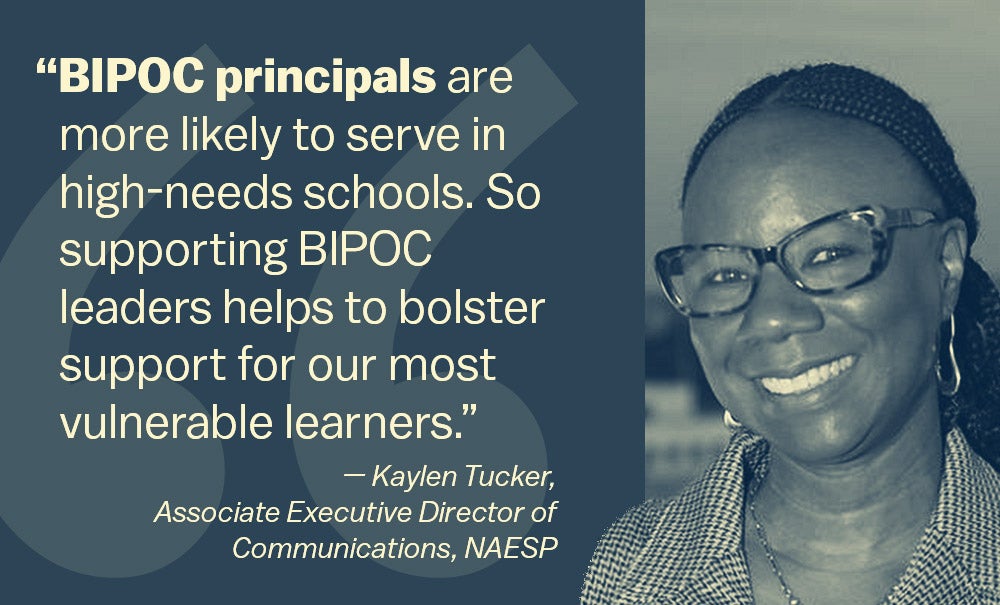A principal pipeline is an approach to leader development that can have major benefits for school districts, as indicated in groundbreaking research we published recently. Pipelines consist of four parts—rigorous job standards, high quality pre-service preparation, selective hiring, and strong on-the-job support and evaluation. In an occasional series, we are examining these components by talking to principals in the school districts that, with Wallace support, tested the pipeline idea. Today, we meet a principal from Hillsborough County Public Schools in Florida who benefited from the district’s revamped evaluation system.
Some people run from change, but Rachael O’Dea thrives on it. When she was appointed in 2015 as a first-year principal to Lanier Elementary School in Tampa, Fla., just 42 percent of the students were proficient in reading and math. Garbage littered the campus, making the school feel like “a forgotten place,” she recalls.
O’Dea wasted no time in leading the Title I school’s turnaround, creating multiple job-embedded professional development opportunities for teachers. She scheduled weekly hourlong sessions for teachers to meet with reading and math coaches, review the standards they were teaching to and collaborate on lesson plans. She implemented a schoolwide leadership program—modeled after Stephen Covey’s book The 7 Habits of Highly Effective People—that includes goal-setting for both teachers and students. The school campus also received a makeover, thanks to a new event O’Dea established that enlists parent volunteers to spruce it up.
Around the same time, O’Dea’s employer, Hillsborough County Public Schools, was in the midst of a makeover too. It was revamping the way principals are evaluated. For O’Dea, the new process fostered a stronger partnership with her supervisor and led her to rethink the way that Lanier engaged its most important ally in raising student achievement: parents.
Nationally, most principals are reviewed annually, but research indicates that few find the process useful to improving their practice. Hillsborough County and the other pipeline districts sought to change that, believing that evaluations could be a key tool to developing effective leaders.
In Hillsborough, the first step was analyzing and modifying the district’s professional standards for principals, which outline what school leaders are expected to know and do. A committee of school leaders, district administrators and others then developed a standards-based evaluation system that supports principals’ professional growth. In addition to student achievement, Hillsborough principals are now evaluated in five realms aligned to the standards: achievement focus and results orientation; instructional expertise; managing and developing people; culture and relationship building; and problem solving and strategic management.
Principal supervisors base their assessment on concrete evidence collected throughout the school year as they interact with the principals they oversee. To determine instructional expertise, for instance, the evaluation examines how well a principal conducts classroom observations, uses data to boost student learning and ensures that curriculum, instructional strategies and assessments are in sync. Supervisor feedback to principals on how they are doing in the various realms is ongoing—one Hillsborough principal described it to researchers as a “pulse check”—so that school leaders get the targeted support they need.
The district has found, for example, that many novice principals struggle with strategic change management. In response, principal supervisors and leadership coaches work with new principals to identify the root causes of the problems at their schools and narrow possible solutions to a few they can do well. They also help principals manage their time, so they stay focused on what matters. “With the demands of the job, it is very easy to become scattered and surface-level with implementation,” says Tricia McManus, Hillsborough’s assistant superintendent for leadership, professional development and school transformation. “Regular on-site coaching provides novice principals with the support needed to be successful.”
Like Hillsborough, the other five districts in the Principal Pipeline Initiative refurbished their principal evaluations, and overall, novice principals across the six districts expressed enthusiasm for the new approach. At least 75 percent of respondents to a survey of novice principals working in the pipeline districts agreed that their evaluations accurately reflected both their performance and the complexity of their jobs. A large majority who were told they needed to improve in at least one practice area reported getting help in that area.
O’Dea says Hillsborough’s current evaluation process begins at the start of the school year, when she meets with her supervisor to review data and set annual goals that are aligned with the school’s needs. “It is more than an evaluation,” she says. “It is about reflection and planning for the school community you are leading.”
While she excelled in her evaluations at Lanier, O’Dea found that the process helped her recognize that she could do more to engage school families, an aspect of culture and relationship building. “It’s hard to get parents in the door, especially at a Title I school,” she says. After brainstorming with her supervisor, she scrapped science day, which historically hadn’t drawn much interest, and replaced it with a leadership day for students to showcase their leadership skills and how they incorporate the 7 Habits in their daily life. Attendance at the event was strong. “When I started thinking differently about how to engage families, beyond academics, it really changed things,” she says.
Last year, district managers asked O’Dea to lead Forest Hills Elementary School, one of Hillsborough’s lowest-performing schools. By then, Lanier students had made significant academic gains: In the 2017-2018 school year, 57 percent were proficient in math and 50 percent in reading. O’Dea left the school in good hands. Her former assistant principal, whom she mentored through the district’s principal training program, is now in charge.
Photo of Rachel O’Dea (above, right) by Claire Holt



